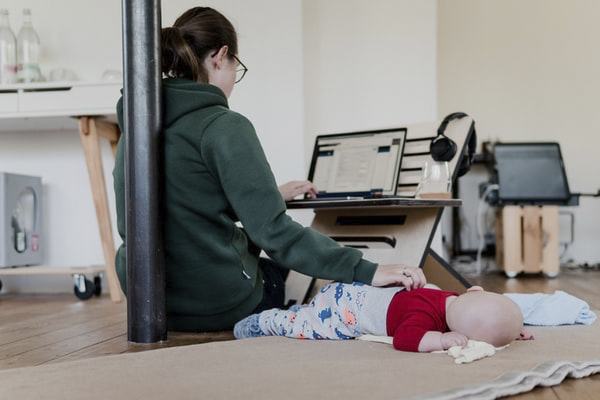Approximately 60% of employees working for large US companies spend more time on caregiving since the Covid-19 outbreak, according to a new study.
The research, carried out by credit ratings firm S&P Global and non-profit AARP (dedicated to empowering the 50+), surveyed over 1,600 employees to provide greater insight into the challenges facing working families since the pandemic began. Entitled Something’s Gotta Give, the research reveals that it could set women back significantly in the labour force as a disproportionate amount of caregiving responsibilities still falls on them.
These findings echo the research from McKinsey & Company and Lean In, which revealed that the “always on” culture with “pressure to work more” and “burnout” as the main reasons for a quarter of women considering exiting the workplace. This could potentially wipe out years of gender equality progress.
S&P/AARP research also confirms that many executives fear that the pandemic will significantly set back women’s advancement in the workforce. However, the report’s also found that adequate family care leave and flexible work policies in corporate America could help retain women in the workplace.
CAREGIVER-FRIENDLY POLICIES
“One in six Americans were already juggling work and family caregiving responsibilities prior to COVID-19, and their unique challenges have only expanded as they try to keep themselves and their loved ones safe,” commented Nancy LeaMond, AARP Executive Vice President and Chief Advocacy & Engagement Officer. “Supporting these dedicated employees with caregiver-friendly workplace policies will help foster a stable and healthy workforce, throughout the pandemic and beyond.”
According to the National Alliance for Caregivers and AARP’s Caregiving in the US 2020 study, approximately 48 million people provide unpaid care to an adult loved one. This could include a parent, spouse, partner or friend with a chronic, disabling or serious health condition. As the US population continues to age, the number of people needing care is also expected to rise.

FLEXIBILITY IS KEY
In addition to formal parental and family caregiving leave, staff stress that flexibility is key to recruiting and retaining women. “The pandemic has highlighted an opportunity for the US private sector to lead the way in adopting more flexible family leave policies, which we noted have a higher impact on women’s participation in the labour force,” according to Martina Cheung, President of S&P Global Market Intelligence.
She believes implementing flexible leave policies, as well as a culture that embraces work-life balance, are “vital to support a more inclusive workforce and achieve collective economic benefits”. “We are proud to partner with AARP to develop this new research and to provide greater insight into the challenges facing working families in light of COVID-19,” she added.
The report found that companies offering flexibility or subsidised/back-up elder or childcare tend to see lower turnover rates for women. This is critical as women are leaving the workforce in record numbers in the wake of the pandemic.

OTHER KEY FINDINGS
Other key findings from the report include:
- Companies with revenue over $1 billion are more likely to offer paid parental leave (58% of large companies compared to 42% of smaller companies) and flexible work schedules (43% of large corporations versus 38% of smaller companies).
- Only 10% of companies offer 14 weeks or more of at least two-thirds paid primary care leave and just 19% offer a minimum of two weeks of paid secondary care leave (defined as the person who is not leading childcare duties).
- Since their commitments have grown, more than 30% of family caregivers are experiencing a strong increase in stress due to the pandemic’s impact on their work-life responsibilities. Nearly 43% of respondents reported a moderate increase in stress.
- Regardless of leave offered, on average, senior managers take far less time for parental or family care than more junior employees. Just 23% of senior managers took more than four weeks of leave, versus about 30% of more junior staff.
- A far greater number of younger caregivers felt their caregiving responsibilities led them to being penalised at work: 63% of caregivers aged 18 to 24, compared to 45% of those aged 35 to 54 and just 14% of those 55 or older.
This research was the first of its kind led by the S&P Global Diversity Research Council – a group of the company’s analysts, researchers and data scientists committed to providing greater insights on inclusion in markets and economies. The report is also part of S&P Global’s #ChangePays initiative, launched in January 2019, which leverages the company’s essential intelligence to advance the discussion around the benefits of women’s participation in the workforce.







































